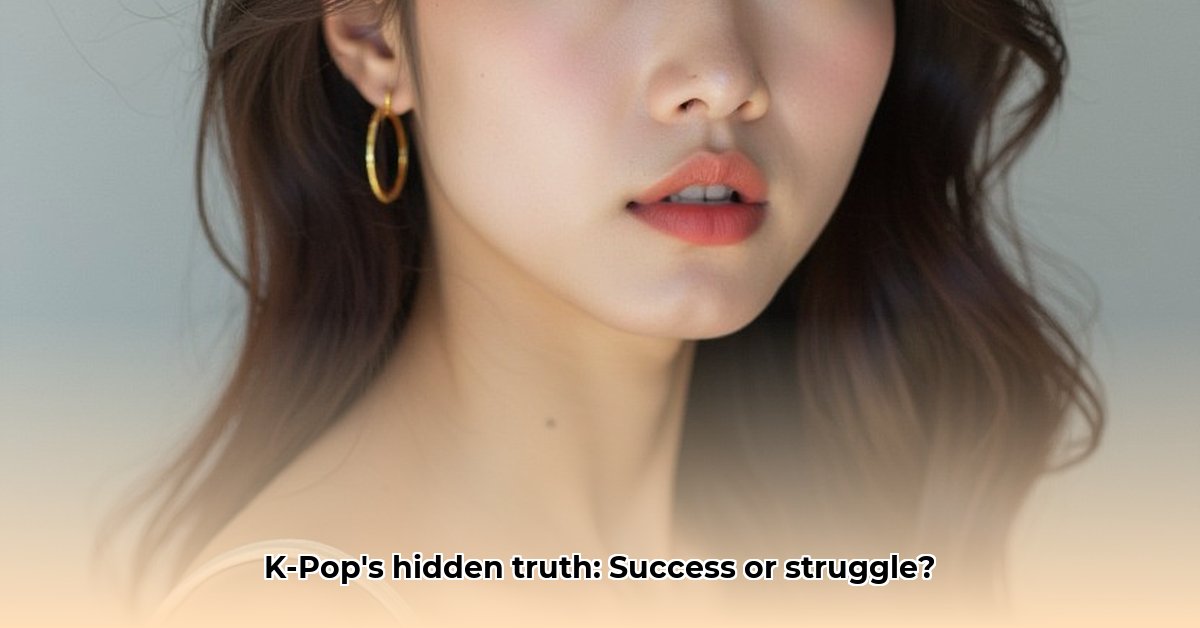K-Pop, often perceived as a world of glitz and glamour, is synonymous with global superstars, catchy tunes, and millions of devoted fans. However, behind the dazzling stage lights lies a world of intense pressure, grueling training, and ethical concerns. This article delves into the K-Pop industry, exploring its successes, dissecting its challenges, examining the intense training regimens, scrutinizing the carefully crafted images, and highlighting the potential for unfair contracts. It also analyzes the powerful connection between idols and fans and considers whether K-Pop can sustain its success while ensuring fairness and ethical treatment for everyone involved. Concerns about young trainees are valid; read more about young K-Pop idols.
The K-Pop Dream Factory: Idols, Success, and Controversy
The K-Pop world is a captivating phenomenon where millions adore the music, dance moves, and polished image of Korean pop stars. But the industry is a complex mixture of extraordinary talent, relentless ambition, and strategic marketing. Understanding the incredible highs and very real lows of the aidoru, the Korean idol, is crucial for anyone seeking to grasp the true essence of K-Pop.
The K-Pop Machine: From Trainee to Global Fame
Becoming a K-Pop idol is a long and rigorous process, often starting at a young age. Aspiring idols, frequently teenagers, begin as trainees, undergoing intense training that can last for years. They dedicate countless hours to perfecting their singing, dancing, rapping, acting, and foreign language skills, along with developing an engaging stage presence and learning how to interact with fans. Entertainment agencies invest heavily in these trainees, hoping to transform them into global stars. The trainee system, while undeniably effective in producing polished performers, raises significant ethical questions regarding the well-being, rights, and long-term prospects of these young artists.
Ethical Concerns: Navigating the Dark Side of the Industry
The glamorous world of K-Pop often obscures the challenging realities faced by idols. They endure intense schedules, strict weight management protocols, relentless pressure to conform to specific, often unrealistic, beauty standards, and constant scrutiny from the media and the public. This stressful environment can significantly impact their mental and physical health. Some idols have spoken out about unfair contracts, a lack of control over their careers, privacy invasions, and online harassment. These revelations raise serious concerns about exploitation and agency accountability. Is the price of fame too high, considering the power imbalance between agencies and idols?
The extensive control agencies exert over their artists’ lives extends far beyond the stage, influencing their daily routines, relationships, social media presence, and personal choices. While this control may contribute to the carefully managed image and overall success of the group, it also raises profound questions about autonomy, personal freedom, and authentic artistic expression. Are idols allowed to grow and evolve naturally as individuals, or are they merely cogs in a highly refined, but ultimately restrictive, machine?
The Powerful Parasocial Relationship: The Fans and the Stars
K-Pop’s success relies on the unique and powerful connection between fans and idols, a relationship often described as parasocial. Fans invest deeply, forming strong emotional bonds with their favorite performers, often feeling as though they know them personally despite limited real-world interaction. This deep emotional investment fuels the industry’s profitability through album sales, merchandise purchases, concert attendance, and online engagement. However, this parasocial dynamic also raises ethical concerns. The one-sided nature of these relationships can be emotionally taxing for both fans and artists, potentially leading to unhealthy attachments and unrealistic expectations. Restrictions placed on idols’ dating lives by agencies, driven by fan expectations, highlight this power imbalance and add another layer to the ethical complexity of the K-Pop industry.
The Future of K-Pop: A Call for Balance and Change
To ensure the long-term sustainability of the K-Pop industry, it is crucial to maintain its global appeal while addressing the pressing ethical concerns. This requires a multi-faceted approach, including implementing fairer contracts that protect idols’ rights and well-being, improving trainee welfare and support systems, increasing transparency in agency practices, and fostering a culture of respect and open communication. Fans, as active participants in the K-Pop ecosystem, can also play a vital role by holding agencies accountable, supporting groups that prioritize ethical principles, and promoting responsible fandom behavior. Government oversight, through updated regulations and proactive enforcement, can further streamline industry standards and protect performers’ rights, particularly those of minors. Ultimately, a collaborative effort involving agencies, idols, fans, and government bodies is needed to create a more sustainable and ethical K-Pop industry.
Strategies for Change: Working Towards a Better Future
A fundamental shift towards prioritizing ethical practices and long-term artist well-being is essential for the continued success and evolution of K-Pop.
- Idols: Forming unions or support networks to collectively advocate for better contract terms, negotiate creative control, and demand greater agency in their career decisions. Seeking legal counsel to fully understand their rights and options is also paramount.
- Agencies: Implementing comprehensive mentorship programs, providing mental health resources for trainees and established idols, adopting sustainable business models that value ethical practices over short-term profits, and prioritizing artist well-being alongside financial success. Transparency in financial arrangements and open communication with artists are also crucial.
- Fans: Supporting ethically conscious groups, promoting responsible fandom behavior, actively engaging in advocacy for industry transparency, and being mindful of the pressures and challenges faced by idols. Promoting healthy parasocial relationships and respecting idols’ privacy are also important considerations.
The journey towards an ethical and sustainable K-Pop industry requires collective action, open dialogue, and a unwavering commitment to prioritizing the well-being and human rights of the artists who power it. Only through these concerted efforts can the K-Pop industry maintain its global success while ensuring that the individuals who contribute to its vibrant and dynamic landscape are protected, respected, and empowered.
How to Negotiate Fairer K-Pop Idol Contracts: A Comprehensive Guide
Key Insights:
- K-Pop contracts have a history of being exploitative, featuring excessively long terms, unfair profit-sharing arrangements, and restrictive clauses that limit artists’ autonomy.
- The Korean Fair Trade Commission (KFTC) has implemented reforms aimed at addressing these issues, but their enforcement is often inconsistent, and loopholes persist.
- Significant power imbalances persist between entertainment agencies and aspiring idols, necessitating stronger regulatory oversight and proactive artist empowerment initiatives.
- Navigating these complex contracts requires specialized legal expertise, strategic negotiation skills, and a thorough understanding of the K-Pop industry’s unique dynamics.
- The future of K-Pop hinges on fostering more equitable and transparent artist-agency relationships that prioritize artist well-being and protect their rights.
The K-Pop Machine: A System of Dual Realities
The K-Pop industry is a global phenomenon, generating billions of dollars in revenue each year and captivating audiences worldwide. The highly structured “trainee system” is undeniably effective at identifying, developing, and producing talented idols. However, this system has also been criticized for its demanding nature, intense pressure, and potential for exploitation. A central question for the industry is: how can we balance the demands of this rigorous system with the well-being, rights, and long-term career prospects of the artists involved?
Ethical Concerns: Exploitation and Unfair Contracts
K-Pop contracts have faced intense scrutiny for potentially exploitative clauses, including excessively long contract durations (often ranging from seven to fifteen years), unequal profit-sharing arrangements that disproportionately favor the agency, restrictions on artists’ creative control and personal lives, and penalties for contract breaches that can trap idols in debt. While the KFTC has implemented changes aimed at mitigating these issues, ensuring that contracts truly reflect fair and equitable practices remains a persistent challenge. The fundamental question of how to negotiate fairer K-Pop idol contracts requires a multi-faceted approach that addresses the root causes of these imbalances and empowers artists to advocate for their rights.
The Parasocial Relationship: Navigating Power Imbalances
The parasocial relationship between K-Pop idols and their fans is a cornerstone of the industry’s success. Idols, often young and relatively inexperienced in business matters, may find themselves in a vulnerable position when negotiating contracts with powerful and well-resourced entertainment agencies. It’s crucial to address this inherent power imbalance by empowering idols with knowledge, resources, and support networks that enable them to advocate effectively for themselves and protect their rights. Independent legal counsel, financial literacy training, and access to mental health support are essential components of this empowerment process.
Case Studies: Examining High-Profile Legal Battles
Several high-profile legal battles involving K-Pop idols and their agencies have revealed the significant challenges artists face in achieving fairer contracts and asserting their rights. Landmark cases involving groups like TVXQ/JYJ and individual EXO members serve as valuable learning points, highlighting the need for stronger legal protections, more transparent accounting practices, and readily accessible avenues for resolving disputes. Analyzing these cases, understanding the legal arguments involved, and learning from the outcomes is a key element of how to negotiate fairer K-Pop idol contracts.
A Path Forward: Toward a More Equitable Industry
The future sustainability and ethical integrity of K-Pop depend on addressing the systemic issues and ethical concerns outlined above through a collaborative and comprehensive effort. Idols need access to independent and trustworthy legal counsel from the outset of their careers, empowering them to understand their rights and negotiate favorable contract terms. Entertainment agencies must prioritize ethical practices, adopt transparent accounting methods, and foster a culture of respect and open communication with their artists. The KFTC and other relevant government bodies must strengthen regulations, increase transparency in the industry, and actively enforce existing laws to protect artists’ rights and prevent exploitation. A fundamental shift in power dynamics is needed
- Discover Affordable Singing Lessons Near Me to Unlock Your Potential - February 24, 2026
- Affordable Vocal Lessons Bring Professional Singing Guidance Within Reach - February 23, 2026
- Local Vocal Lessons Offer Expert Guidance for Every Singer - February 22, 2026










